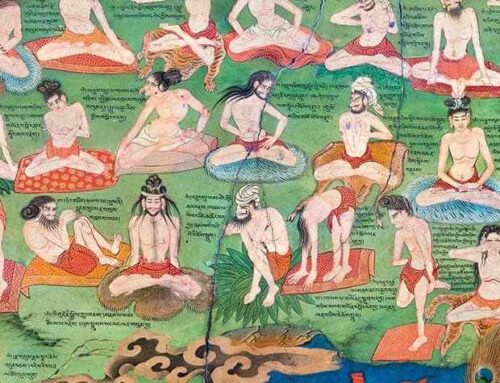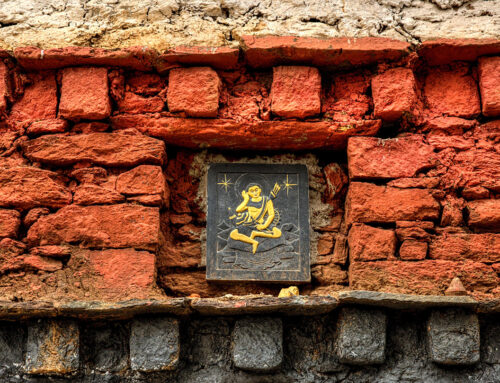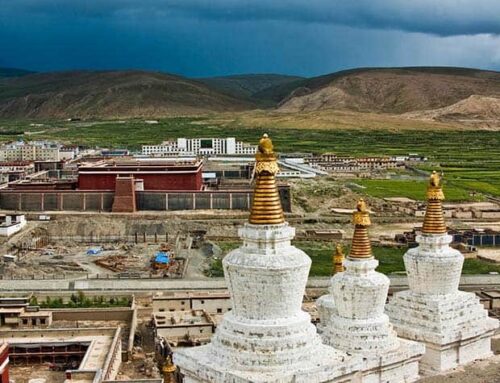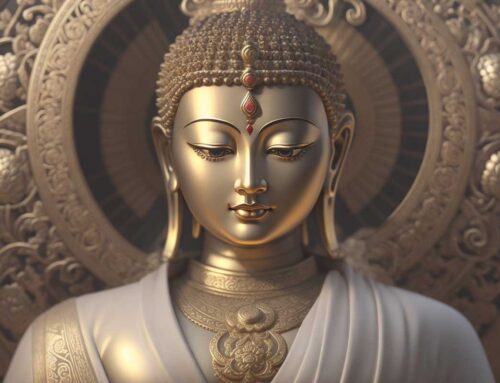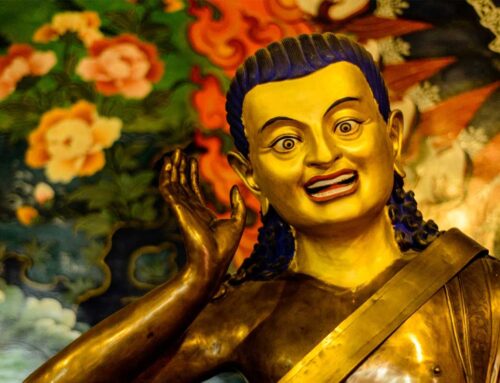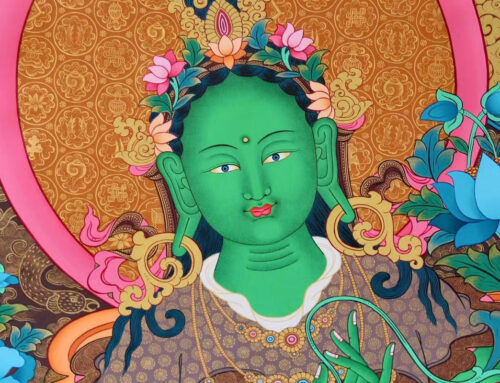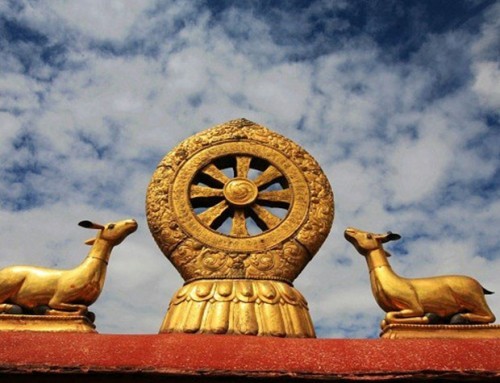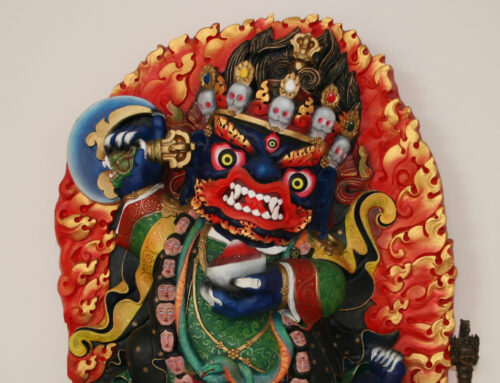Bön (བོན་པོ།) stands as the native faith of the Tibetan people dwelling within the historic Qinghai-Tibetan Plateau. Rooted in shamanistic traditions, it is distinguished by its enigmatic ceremonies, incantations, offerings, and the manipulation of spiritual forces. Central to this belief system is a profound focus on the art of meditation.
The Tibetan Bön Religion is an ancient spiritual tradition that predates the arrival of Buddhism in Tibet. With a rich history and distinct practices, Bön holds a significant place in the cultural and religious landscape of the Tibetan plateau.
In this article, we will explore the beliefs, teachings, practices, and historical development of the Bön religion, as well as its relationship with Tibetan Buddhism and its contemporary relevance.

According to the census, there are about a hundred thousand Bön followers making it to 10% of the entire Tibetan population. There are 264 Bön Monasteries, nunneries and Hermitages. Today Bön can be found in the more isolated parts of western and northern Tibet.
Introduction to the Tibetan Bön Religion
The Bön religion originated in the land of Zhang Zhung, which encompassed present-day western Tibet and parts of neighboring regions. It traces its roots back thousands of years, making it one of the oldest spiritual traditions in the Himalayan region. Bön encompasses a comprehensive system of beliefs, rituals, and practices aimed at achieving spiritual enlightenment and harmonious existence.
Historical Background of Bön
According to Bön teachings, its origins can be traced to the mythical figure of Shenrab Miwoche, who is considered the founder of the Bön religion. Shenrab Miwoche is believed to have brought divine knowledge and teachings to humanity, offering guidance on how to live a virtuous and meaningful life. Over the centuries, Bön flourished and evolved, absorbing local customs and beliefs as it spread across the Tibetan plateau.
Beliefs and Teachings of Bön
The Concept of Bön
Bön encompasses a holistic worldview that combines aspects of shamanism, animism, and the belief in divine beings. Central to Bön teachings is the notion of the “Zhi” or “Primordial State,” which represents the ultimate nature of reality. Bönpos believe that all beings possess innate Buddha-nature and strive to awaken their true potential through spiritual practices and self-transformation.
Deities and Spirits in Bön
Bön recognizes a pantheon of deities and spirits, each with their own unique characteristics and roles. These deities are seen as intermediaries between the human realm and the realms of higher beings. Rituals and offerings are made to invoke their blessings and guidance. Among the prominent deities in Bön are Shenlha Okar, the divine lord of compassion, and Sangpo Bumtri, the deity associated with longevity and healing.
Bön Rituals and Ceremonies
Rituals and ceremonies play a significant role in Bön practices. They serve as means to connect with the spiritual realm, seek protection, and cultivate positive energies. Bön rituals often involve chanting of sacred mantras, making offerings, performing sacred dances, and reciting prayers. Festivals and pilgrimages are also important aspects of Bön religious life, bringing together communities and fostering a sense of spiritual unity.
Practices and Meditation in Bön
Meditation Techniques in Bön
Meditation holds a central place in Bön practice. Various meditation techniques are employed to calm the mind, develop mindfulness, and cultivate inner peace. These techniques include focusing on the breath, visualizations, and mantra recitation. Through sustained meditation practice, practitioners aim to achieve a direct experience of the nature of mind and attain spiritual awakening.
Bönpo Monastic Tradition
Bön has a well-established monastic tradition known as the Bönpo Sangha. Monasteries serve as centers of learning and spiritual practice, providing guidance and support to both monastic and lay practitioners. Bönpo monks and nuns undergo rigorous training, studying sacred texts, engaging in meditation retreats, and upholding the ethical principles of the Bön tradition.
Role of Bönpo Lamas
Bönpo Lamas, or spiritual teachers, play a crucial role in guiding practitioners on their spiritual path. They possess extensive knowledge of Bön teachings and rituals, serving as custodians of the tradition. Bönpo Lamas provide spiritual instructions, empower individuals through initiations, and offer guidance on navigating the complexities of life.
Bön and Tibetan Buddhism
Relationship between Bön and Buddhism
Bön and Tibetan Buddhism share a complex and intertwined history. When Buddhism was introduced to Tibet in the 7th century, it encountered the pre-existing Bön tradition. Over time, interactions between the two resulted in the integration of Bön elements into Tibetan Buddhism. Scholars note that this process of syncretism led to the enrichment and diversification of Tibetan Buddhism.
Bön Influence on Tibetan Buddhism
Bön has left a lasting impact on Tibetan Buddhism, particularly in the realm of rituals, ceremonies, and certain philosophical concepts. Elements of Bön cosmology, deity worship, and shamanic practices have been assimilated into Tibetan Buddhist traditions. The Bön influence can be seen in the reverence for local deities, protective rituals, and the use of mantras and mandalas.
Syncretism and Coexistence
While there have been periods of tension and competition between Bön and Buddhism in Tibetan history, they have also coexisted and influenced each other positively. Over time, a mutual respect and recognition developed, leading to shared rituals, teachings, and practices. Bön and Tibetan Buddhism have found a way to coexist, each offering distinct paths to spiritual awakening.
Preservation and Revival of Bön
Revitalization of Bön
Bön experienced a revival, primarily driven by the efforts of Bönpo masters and their disciples. Bön monasteries were rebuilt, sacred texts were recovered, and efforts were made to preserve and transmit the teachings of Bön. Today, Bön has regained its vitality and continues to attract followers both within Tibet and in the global cummunity.
Current State of Bön
Bön continues to thrive as a living tradition, with practitioners spread across Tibet, India, Nepal, and other parts of the world. Bön monasteries serve as important cultural and educational institutions, preserving the rich heritage of Bön teachings. Organizations dedicated to Bön scholarship and research play a crucial role in advancing the understanding and appreciation of this ancient tradition.
Bön in Contemporary Society
Bön’s Impact on Tibetan Culture
Bön has deeply influenced Tibetan culture, permeating various aspects of Tibetan life, including art, music, literature, and rituals. Festivals and ceremonies associated with Bön are integral to the cultural fabric of Tibetan society. Bön’s teachings on compassion, wisdom, and interconnectedness continue to shape the values and worldview of the Tibetan people.
Bön and Modern Spiritual Seekers
In recent years, Bön has attracted interest from spiritual seekers around the world who are drawn to its unique blend of ancient wisdom and practical teachings. The inclusive nature of Bön, with its emphasis on the innate potential for enlightenment in all beings, resonates with those seeking personal growth, inner peace, and a deeper connection with the spiritual dimensions of existence.
Global Recognition of Bön
Bön has gained increasing recognition globally, with scholars, practitioners, and spiritual enthusiasts studying and engaging with its teachings. Academic institutions offer courses and research programs dedicated to Bön studies, contributing to a deeper understanding of this ancient tradition. Bön’s universal message of compassion, wisdom, and spiritual transformation continues to inspire people from diverse backgrounds.
Conclusion
The Tibetan Bön Religion, with its ancient origins and rich spiritual heritage, offers a unique and profound path to spiritual awakening. Its teachings, practices, and rituals provide practitioners with tools for self-transformation and a deeper understanding of the nature of reality. Bön’s resilience in the face of historical challenges and its contemporary relevance attest to its enduring impact on Tibetan culture and its potential to inspire and guide spiritual seekers worldwide.
FAQs On Bön Religion
Is Bön a form of Tibetan Buddhism?
No, Bön is a distinct religious tradition that predates the arrival of Buddhism in Tibet. Although Bön and Tibetan Buddhism have interacted and influenced each other, they maintain their separate identities.
How old is the Bön religion?
The origins of the Bön religion can be traced back thousands of years, making it one of the oldest spiritual traditions in the Himalayan region.
Are there Bön monasteries?
Yes, Bön has a well-established monastic tradition, and there are Bön monasteries that serve as centers of learning, practice, and spiritual guidance.
Can anyone practice Bön?
Yes, Bön teachings are open to anyone who seeks to explore its path. Bön offers practical teachings and meditation practices that can be incorporated into one’s spiritual journey.
What is the significance of Bön in Tibetan culture?
Bön has deeply influenced Tibetan culture, shaping its rituals, art, music, and worldview. Bön festivals and ceremonies are integral to the cultural fabric of Tibetan society, fostering a sense of community and spiritual connection.
About Tibet Travel & Tours
Tibet Travel & Tours is a local travel agency in Tibet that offers unique and authentic experiences to travelers from all around the world. As a leading tour operator in Tibet, we provide high-quality Tibet Travel services that are tailored to our clients’ needs and preferences.
Our team of experienced and knowledgeable professionals strives to ensure that our clients have a hassle-free and memorable trip in Tibet. We specialize in various types of tours, including cultural tours, trekking and hiking tours, and adventure tours.
Our commitment to providing exceptional service has earned us a reputation as one of the best local travel agencies in Tibet. Contact us today to plan your unforgettable trip to Tibet.
Explore Tibet with a local Tibetan Travel Agency
If you’re looking to explore Tibet, starting your journey with a reputable Tibetan travel agency in Tibet is crucial. Tibet Travel & Tours is a great choice to begin your adventure with their extensive knowledge of the region and commitment to responsible tourism.
Their Tibet tour packages cater to a range of interests and budgets, making it easy to plan a trip that suits your needs. Before embarking on your tibet tour, it’s essential to have the right Tibet travel information and necessary documents, including a Tibet travel permit.
The Tibet Travel Planner provided by i-Tibet travel is an excellent resource to plan your trip, including tips on what to pack, where to stay, and what to see.
For beginners, the “About Tibet” guide provided by i-Tibet travel offers a comprehensive overview of the region’s history, culture, and top attractions. So, start your Tibet travel plan here with i-Tibet travel and discover the magic of Tibet for yourself.


